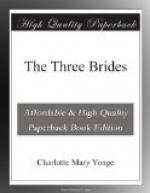“Thirty-four! Not a bit too old for the other end of the romance!”
“Take care, Rosie. Don’t say a word to Jenny till we know more. She must not be unsettled only to be disappointed.”
“Do you think she would thank you for that, you cold-blooded animal?”
“I don’t know; but I think the suspense would be far more trying than the quiet resigned calm that has settled down on her. Besides, you must remember that even if Archie were found, the mystery has never been cleared up.”
“You don’t think that would make any difference to Jenny?”
“It makes all the difference to her father; and Jenny will never be a disobedient daughter.”
“Oh! but it will—it must be cleared! I know it will! It is faithless to think that injustice is not always set right!”
“Not always here,” said Julius, sadly. “See, there’s the Backsworth race-ground, the great focus of the evil.”
“Were racing debts thought to have any part in the disaster?”
“That I can’t tell; but it was those races that brought George Proudfoot under the Vivian influence; and in the absence of all of us, poor Archie, when left to himself after his mother’s death, had become enough mixed up in their amusements to give a handle to those who thought him unsteady.”
“As if any one must be unsteady who goes to the races!” cried Rosamond. “You were so liberal about balls, I did expect one little good word for races; instead of which, you are declaring a poor wretch who goes to them capable of embezzling two thousand pounds, and I dare say Anne agrees with you!”
“Now, did I ever say so, Anne?”
“You looked at the course with pious horror, and said it justified the suspicion!” persisted Rosamond.
“That’s better,” said Julius; “though I never even said it justified the suspicion, any more than I said that balls might not easily be overdone, especially by some people.”
“But you don’t defend races?” said Anne.
“No; I think the mischief they do is more extensive, and has less mitigation than is the case with any other public amusement.”
“H’m!” said Rosamond. “Many a merry day have I had on the top of the regimental drag; so perhaps there’s nothing of which you would not suspect me.”
“I’ll tell you what I more than suspect you of,” said Julius, “of wearing a gay bonnet to be a bait and a sanction to crowds of young girls, to whom the place was one of temptation, though not to you.”
“Oh, there would be no end to it if one thought of such things.”
“Or the young men who—”
“Well,” broke in Rosamond, “it was always said that our young officers got into much less mischief than where there was a straight-laced colonel, who didn’t go along with them to give them a tone.”
“That I quite believe. I remember, too, the intense and breathless sense of excitement in the hush and suspense of the multitude, and the sweeping by of the animals—”




